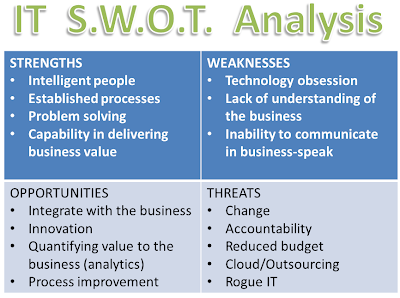In an earlier post I highlighted the fact
that ITIL-speak is not aligned with customer terminology. Now I want to take this a bit further and say
that ITIL-speak isn’t even aligned with common IT speak.
IT has a natural language of its own that varies slightly from organization to organization. To a certain
extent, ITIL has tried to go against this in the name of standardization. Adoption of a global terminology standard
benefits the industry as a whole, but does it benefit an individual organization which has
already settled on terminology that is understood clearly within the
organization? Naturally, it is very
difficult to get people to adopt new terminology in place of a lexicon that has
become established over many years, so there are major cultural change issues
involved in throwing out something that works for the sake of standardizing
with the outside world. People will not
get behind such an initiative because they will not see any value in it – only
disruption – which is a fair point.
Standards that don’t bring real benefits to the individual organization
fail to take hold.
- IT Manager: "We're calling it X instead of Y now"
- Techie: “Why is that word better than this one?”
- IT Manager: “Because it’s the standard”
- Techie: “Not in this organization it isn’t!”
Indeed, the ITIL glossary is far too cumbersome, with the
ITIL V3 Glossary running up a total of 58 pages, there will be few people on
the planet who have digested and assumed the entire ITIL dictionary. Thus, we can never expect mainstream adoption
whilst the effort required is so great.
Perhaps terminology should be chopped up into chunks and associated with
different processes or maturity levels so that it can be adopted in a focused
manner. After all, there would be little
benefit in force-feeding your IT department terminology that applies to
processes which are outside the ITSM roadmap.
Once again we find ourselves back in the position of looking things in terms
of what is of practical value to us, right now.
"Mr ITIL, tear down this wall."
To simplify ITIL terminology, each process should have a surrounding cluster of
terminology, indicating the standard terminology that is commonly used in the
strategic and day-to-day management of that process, including the ITIL, IT and
business/customer terminology – and how one maps to another so that it actually helps develop understanding and communication in real life. This would allow organizations to select a
standard set of terminology, but one that fits the context of their own
business.
- Customer: “I’ve got a problem with my printer”
- Service Desk Analyst: “Actually, Sir - I think you mean you’re having an Incident. It will be a Problem when we create a Problem record in our ITSM tool.”
- Customer: “@&#? #$*!”
Organizations that think a change in dialect is going to fix IT won’t make much progress. It’s about
adopting the ideas behind the words, not just the words themselves.



